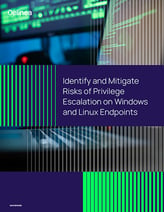The many positive outcomes when consolidating Linux identities

Katherine Vondrak
Linux is one of the most popular operating systems used for web servers, supercomputers, and cloud computing platforms.
According to TrueList, there are over 600 active Linux variations in circulation with 96.3% of the top one million web servers running Linux.
It’s challenging to provide an exact number of active Linux variations, as the Linux operating system is highly customizable and can be adapted for use in many different environments.
Let’s recap some commonly used Linux server distributions, which include:
- Ubuntu Server: Ubuntu is a popular Linux distribution for servers, known for its stability and ease of use.
- CentOS: CentOS is a community-supported distribution based on Red Hat Enterprise Linux, and is often used for web hosting, database management, and other server-based applications.
- Debian: Debian is a stable and reliable distribution often used for database servers, web servers, and other server-based applications.
- Fedora Server: Fedora is a community-supported distribution that's often used for web hosting, database management, and other server-based applications.
- Red Hat Enterprise Linux (RHEL): RHEL is a commercially supported distribution that's often used in enterprise environments for database management, web hosting, and other server-based applications.
- SUSE Linux Enterprise Server: SUSE Linux Enterprise Server is a commercially supported distribution that's often used in enterprise environments for server-based applications, web hosting, and database management.
There are many other Linux server distributions as well, each designed for specific purposes or environments. With so many Linux systems in operation, it only makes sense to try to consolidate the Linux identities to get a handle on managing the vast number of identities.
Linux identity consolidation is defined as the process of integrating multiple user accounts, groups, & authentication mechanisms into a single, unified system.
Now let’s discuss the top four positive outcomes you can benefit from with Linux Identity Consolidation.
- Improved Security - Enforce strong, centralized policies for user access and authentication, helping to reduce the risk of unauthorized access to the system.
- Simplified administration - Easily manage user accounts and permissions and enforce policies and standards across the organization.
- Enhanced interoperability - Improve the ability of different systems and applications to communicate and share data, as they can all use the same authentication mechanism and user accounts.
- Increased efficiency - By streamlining the management of identities, you can reduce the time and resources required to maintain and update user accounts.

Delinea’s latest version of Server Suite delivers Linux Consolidation and so much more. Server Suite provides centralized discovery, management, and user administration for Linux, Unix, and Windows systems to enable rapid identity consolidation natively into Active Directory using Delinea-patented Zones technology.
The results are higher levels of identity assurance and a significantly reduced attack surface with fewer identity silos, redundant identities, and local accounts. The recently updated Server Suite release includes usability enhancements, updated authentication functionality, and additions to the list of supported platforms.
Take a look at this short demo of Server PAM in action:
Identify and Mitigate Risks of Unwanted Privilege Escalation on Windows and Linux Endpoints

Identify and mitigate risks of privilege escalation on Windows and Linux endpoints



